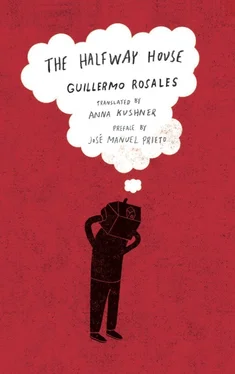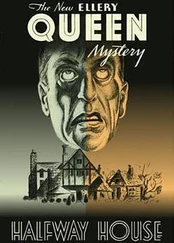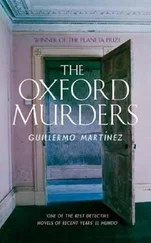“You’re going to tell me about rock and roll?” I scream at the cars. “Me! I who came to this country with a picture of Chuck Berry in my shirt pocket!”
I continue. I get to a place they call downtown , full of gray, slapdash buildings. Elegantly dressed Americans, black and white alike, leave their workplaces to eat a hot dog and drink Coca-Cola. I walk among them, ashamed of my threadbare checked shirt and of the old pants that dance around my hips. I end up going into a shop that sells pornographic magazines. I go over to the rack and pick one of them up. I feel my penis stiffening a little and I crouch on the floor to hide my erection. Oh, God! Women. Naked women in all the positions imaginable. Beautiful women belonging to millionaires. I shut the magazine and wait a minute for the excitement to pass. When it has passed, I stand up, put the magazine back and leave. I walk on. I walk on into the heart of downtown. Until I stop, tired, and realize it’s time to go back to the halfway house.
I get to the halfway house and try to enter through the front door. It’s locked. A maid, whose name is Josefina, cleans the house inside, so the nuts have been banished to the porch.
“Get out, locos! ” Josefina says, pushing them all out with a broom. And the nuts leave without complaint, taking their seats on the porch. It’s a dark porch, surrounded by black metallic cloth, with an ever-present puddle of urine at the center thanks to old one-eyed Reyes, who has lost all shame and urinates everywhere all the time, despite the punches he receives on his squalid chest and gray, unkempt head. I turn around and sit on one of the porch chairs, inhaling the strong smell of urine. I take the book of English poets out of my pocket. But I don’t read any of it. I just look at the cover. It’s a beautiful book. Thick. Finely bound. El Negro gave it to me when he came back from New York. It cost him twelve dollars. I look at some of the illustrations in the book. I see Samuel Coleridge’s face again. I see John Keats, he who in 1817 asked himself,
Ah! why wilt thou affright a feeble soul?
A poor, weak, palsy-stricken, churchyard thing,
Whose passing-bell may ere the midnight toll
Then Ida, the grande dame come to ruin, gets up from her chair and comes over to me.
“Do you read?” she asks.
“Occasionally,” I respond.
“Oh!” She says. “I used to read a lot, back in Cuba. Romance novels.”
“Oh!”
I look at her. She dresses relatively well compared to the way the other people at the halfway house dress. Her body, while old, is clean and smells vaguely of cologne water. She’s one of the ones who knows how to exercise her rights and demands her thirty-eight dollars a month from Mr. Curbelo.
She was a member of the bourgeoisie back in Cuba, in the years when I was a young communist. Now the communist and the bourgeois woman are in the same place, the same spot history has assigned them: the halfway house.
I open the book of Romantic English poets and read a poem by William Blake:
Little Lamb, who made thee?
Dost thou know who made thee,
Gave thee life & bid thee feed
By the stream & o’er the mead
I close the book. Mr. Curbelo pokes his head through the porch door and motions to me with his hands. I go. At his desk, a well-dressed, well-groomed man is waiting for us with a thick gold chain around his neck and a large watch on his wrist. He’s wearing a fetching pair of tinted glasses.
“This is the psychiatrist,” Mr. Curbelo says. “Tell him everything that’s the matter with you.”
I take a seat in a chair that Curbelo brings me. The psychiatrist takes a piece of paper out of a folder and starts to fill it out with a fountain pen. While he writes, he asks me, “Let’s see, William. What’s the matter?”
I don’t answer.
“What’s the matter?” he asks again.
I take a deep breath. It’s the same bullshit as always.
“I hear voices,” I say.
“What else?”
“I see devils on the walls.”
“Hmmm!” he says. “Do you talk to those devils?”
“No.”
“What else do you have?”
“Fatigue.”
“Hmmm!”
He writes for a long time. He writes, writes, writes. He takes off the tinted glasses and looks at me. His eyes don’t show the slightest interest in me.
“How old are you, William?”
“Thirty-eight.”
“Hmmm!”
He looks at my clothes, my shoes.
“Do you know what day today is?”
“Today,” I say uncomfortably. “Friday.”
“Friday, the what?”
“Friday. . the fourteenth.”
“Of what month?”
“August.”
He writes again. While he does, he discloses impersonally, “Today is Monday, the twenty-third of September."
He writes a little more.
“Okay, William. That will be all.”
I stand up and go back to the porch. There’s a surprise for me there. El Negro has come to see me all the way from Miami Beach. He has a book in his hand and he holds it out to me as a greeting. It’s Time of the Assassins by Henry Miller.
“I’m afraid it will ruin you,” he says.
“Stop fucking with me!” I reply.
I take him by the arm and lead him to a broken-down car that sits in the garage of the halfway house. It’s a car from 1950 that belongs to Mr. Curbelo. One day it just stopped forever and Mr. Curbelo left it there, at the halfway house, so it would go on deteriorating, slowly, along with the nuts. We get in the car and sit in the back seat, between oxidized springs and pieces of dirty padding.
“What’s new?” I anxiously ask El Negro . He’s my link to society. He goes to meetings with Cuban intellectuals, talks about politics, reads the papers, watches television, and then, every week or two, he comes to see me to share the gist of his travels through the world.
“Everything’s the same.” El Negro says. “Everything’s the same …,” he says. Then, all of a sudden: “Well! Truman Capote died.”
“I know.”
“That’s it,” El Negro says. He takes a newspaper out of his pocket and gives it to me. It’s the Mariel newspaper, edited by young Cubans in exile.
“There’s a poem of mine in there,” El Negro says. “On page six.”
I look for page six. There’s a poem called “There’s Always Light in the Devil’s Eyes.” It reminds me of Saint-John Perse. I tell him. He’s flattered.
“It reminds me of Rains ,” I say.
“Me, too,” El Negro says.
Then he looks at me. He takes in my clothes, my shoes, my dirty, tangled hair. He shakes his head disapprovingly.
“Hey, Willy,” he then says, “you should take better care of yourself.”
“Oh, am I that run down?”
“Not yet,” he says. “But try not to get any worse.” “I’ll take care of myself,” I say.
El Negro pats my knee. I realize that he’s about to leave. He takes out a half-empty pack of Marlboros and gives it to me. Then he takes out a dollar and gives that to me, too.
“It’s all I have,” he says.
“I know.”
We get out of the car. A nut comes up to us to ask for a cigarette. El Negro gives him one.
“Adios, Doctor Zhivago,” he says, smiling. He turns around and leaves.
I go back to the porch. As I am about to go in, somebody calls to me from the dining room. It’s Arsenio, the halfway house second-in-command. He’s shirtless and hiding a can of beer under the table since it’s not right for the psychiatrist who’s visiting the residence today to see him drinking.
“Come here,” he says to me and points to a chair.
Читать дальше












